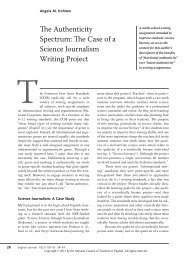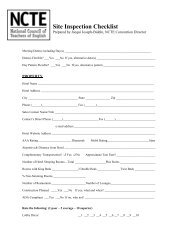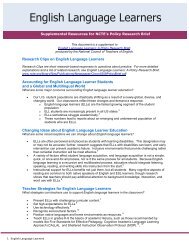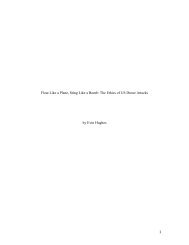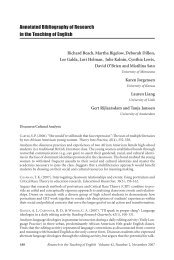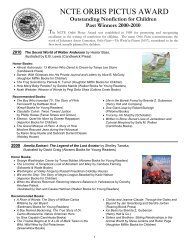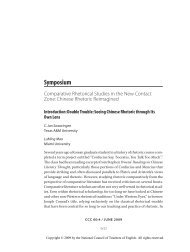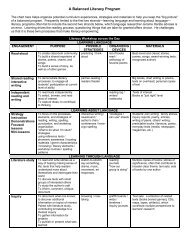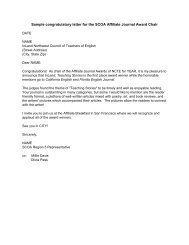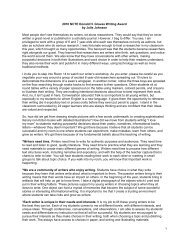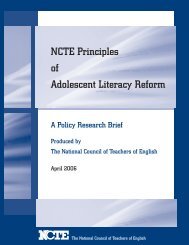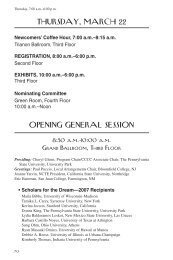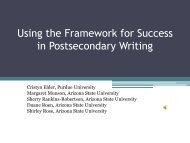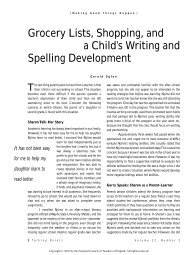Alternative Rhetoric and Morality: Writing from the Margins - National ...
Alternative Rhetoric and Morality: Writing from the Margins - National ...
Alternative Rhetoric and Morality: Writing from the Margins - National ...
You also want an ePaper? Increase the reach of your titles
YUMPU automatically turns print PDFs into web optimized ePapers that Google loves.
C C C 6 1 : 2 / d e c e m b e r 2 0 0 9<br />
David L. Wallace<br />
<strong>Alternative</strong> <strong>Rhetoric</strong> <strong>and</strong> <strong>Morality</strong>: <strong>Writing</strong> <strong>from</strong><br />
<strong>the</strong> <strong>Margins</strong><br />
This article explores <strong>the</strong> need for alternative rhetorics that address systemic marginalization<br />
in American society <strong>and</strong> in <strong>the</strong> practice of rhetoric <strong>and</strong> composition. Specifically,<br />
three concepts <strong>from</strong> queer <strong>the</strong>ory—intersectionality, copresence, <strong>and</strong> disidentification—<br />
are used as a basis for defining an alternative rhetoric. Then, in <strong>the</strong> bulk of <strong>the</strong> article,<br />
Gloria Anzaldúa’s Borderl<strong>and</strong>s/La Frontera is examined to illustrate what engaging in<br />
alternative rhetoric <strong>from</strong> a marginalized cultural position may mean in practice.<br />
[A] central insight to keep fully present in our thinking, ra<strong>the</strong>r<br />
than on <strong>the</strong> periphery, is <strong>the</strong> necessity of resisting a tendency to<br />
view discourse (language in particular use) as a disembodied<br />
force within which we are inevitably, inescapably, innocently<br />
swept along.<br />
—Jacqueline Jones Royster, “Academic Discourses, or Small Boats on a Big Sea”<br />
A t <strong>the</strong> level of <strong>the</strong>ory, <strong>the</strong> field of rhetoric <strong>and</strong> composition has largely accepted<br />
that rhetorical <strong>the</strong>ory must be redefined to account for <strong>the</strong> constructed<br />
nature of agency <strong>and</strong> <strong>the</strong> ongoing processes of cultural reproduction—that<br />
objectivity no longer exists <strong>and</strong> that <strong>the</strong> new game in town is accounting for our<br />
unique subjectivities. Thus, as Bakhtin has led us to underst<strong>and</strong>, all language<br />
<strong>and</strong> all rhetoric is inherently discursive, whe<strong>the</strong>r those using it recognize it or<br />
CCC 61:2 / december 2009<br />
W18
w a l l a c e / a l t e r n a t i v e r h e t o r i c a n d m o r a l i t y<br />
not. As Jacqueline Jones Royster argues in <strong>the</strong> epigraph above, this discursive/<br />
contingent nature of discourse must be at <strong>the</strong> center of any underst<strong>and</strong>ing of<br />
rhetoric <strong>and</strong> composition that takes postmodernism seriously, <strong>and</strong> discourse<br />
must be understood as an embodied force that has real consequences for real<br />
people. Fur<strong>the</strong>r, if we are serious about developing alternative rhetorics that<br />
address our field’s complicity in <strong>the</strong> discourses of power, <strong>the</strong>n those efforts must<br />
begin with an explicit recognition that <strong>the</strong> consequences of discourse are more<br />
severe <strong>and</strong> limiting for some groups in our society than <strong>the</strong>y are for o<strong>the</strong>rs.<br />
A number of scholars have suggested that creating alternative rhetorical<br />
<strong>the</strong>ories <strong>and</strong> practices is critical for <strong>the</strong> survival of marginalized peoples<br />
in American society. For example, American Indian scholars such as Malea<br />
Powell <strong>and</strong> Scott Lyons have begun to expose how <strong>the</strong> practice of rhetoric<br />
has contributed to historical <strong>and</strong> ongoing attempts to erase American Indian<br />
peoples <strong>and</strong> cultures. Jane Hindman (“Making”) reminds us that finding ways<br />
to publicly claim culturally stigmatized identities may be critical to recovering<br />
<strong>from</strong> potentially life-threatening addictions, <strong>and</strong> carmen kynard (among<br />
o<strong>the</strong>rs) argues that denying working-class students of color <strong>the</strong> opportunity<br />
to use <strong>the</strong>ir “everyday discursive practices” in academic writing carries with<br />
it <strong>the</strong> risk of presuming that <strong>the</strong>y are “simply inferior” (32). Yet how we are to<br />
enact <strong>the</strong>se calls remains a complex question.<br />
In response to <strong>the</strong> underst<strong>and</strong>ing that rhetoric is not a neutral tool <strong>and</strong><br />
that it has been complicit in <strong>the</strong> marginalization of groups within American<br />
society, a number of scholars in rhetoric <strong>and</strong> composition have begun exploring<br />
what alternative rhetorics would look like in <strong>the</strong>ory <strong>and</strong> practice (e.g., see edited<br />
collections by Bishop; Gray-Rosendale <strong>and</strong> Gruber; Schroeder, Fox, <strong>and</strong> Bizzell).<br />
This work illustrates that sorting out what counts as “alternative” rhetorical<br />
<strong>the</strong>ory <strong>and</strong> practice is a difficult business that must take into account not only<br />
<strong>the</strong> intent of <strong>the</strong> originating interlocutor <strong>and</strong> <strong>the</strong> conventional or transgressive<br />
nature of <strong>the</strong> discourse practices <strong>the</strong>mselves but also <strong>the</strong> contexts for <strong>the</strong> act<br />
<strong>and</strong> <strong>the</strong> varied perspectives <strong>and</strong> experiences of those who see or hear <strong>the</strong> act.<br />
Defining a moral basis for alternative rhetoric is one important step in sorting<br />
out <strong>the</strong>se complexities. Indeed, more than fifteen years ago, Patricia Bizzell<br />
argued that attempts to develop postmodern rhetorical <strong>the</strong>ory <strong>and</strong> practice<br />
have been largely stymied because we have been slow to act on <strong>the</strong> realization<br />
that just because “no unimpeachable authority <strong>and</strong> transcendent truth exist,<br />
this does not mean that no respectable authority <strong>and</strong> no useable truth exist”<br />
(665). Bizzell identifies our nostalgia for <strong>the</strong> good old days of absolute Truth<br />
W19
C C C 6 1 : 2 / d e c e m b e r 2 0 0 9<br />
<strong>and</strong> for value-free, transparent discursive practices as impediments to taking<br />
up <strong>the</strong> serious work of defining this new moral basis. Fur<strong>the</strong>r, she argues<br />
that engaging in what passes as progressive pedagogy without defining this<br />
new moral basis amounts to “a sort of pedagogical bad faith” in which we are<br />
“calling students to <strong>the</strong> service of some higher good which we do not have <strong>the</strong><br />
courage to name” (670).<br />
In this article, I explore what it means to name <strong>the</strong> good to which we call<br />
students (<strong>and</strong> ourselves), arguing that alternative rhetoric begins at <strong>the</strong> point<br />
where one moves beyond <strong>the</strong> recognition (<strong>and</strong> perhaps celebration) of discursive<br />
subjectivity to exploring (<strong>and</strong> accepting one’s participation in) systems of<br />
power that use language <strong>and</strong> rhetoric both to disenfranchise <strong>and</strong> to liberate.<br />
To extend Bizzell’s argument, I contend that too many postmodern rhetorical<br />
<strong>the</strong>orists have been content to end <strong>the</strong>ir contributions to rhetorical <strong>the</strong>ory<br />
<strong>and</strong> composition pedagogy with explicating <strong>the</strong> always unique interactions<br />
of subjectivities. To stop here is to be in danger of invoking a risky form of individualism<br />
that allows one to invoke <strong>the</strong> potential powers of deconstruction<br />
without accepting <strong>the</strong> attendant responsibility to assess one’s own participation<br />
in systems of oppression. The critical question <strong>the</strong>n becomes how do we move<br />
forward; how do we develop a practical sense of morality that provides <strong>the</strong> basis<br />
for rhetorical <strong>the</strong>ory, practice, <strong>and</strong> pedagogy that substantively addresses not<br />
only <strong>the</strong> contingent nature of subjectivity but also real effects of systemic oppression?<br />
To explore this question, I draw three concepts <strong>from</strong> queer <strong>the</strong>ory,<br />
arguing that <strong>the</strong>y provide means for thinking about identity <strong>and</strong> rhetoric in<br />
a way that more substantively accounts for subjectivity, <strong>and</strong> <strong>the</strong>n I provide a<br />
reading of Gloria Anzaldúa’s Borderl<strong>and</strong>s/La Frontera that illustrates how such<br />
an approach to rhetoric might work in practice.<br />
Intersectionality, Copresence, Disidentification, <strong>and</strong> Defining<br />
<strong>Alternative</strong> <strong>Rhetoric</strong><br />
<strong>Rhetoric</strong>ians have debated <strong>the</strong> relationships among rhetoric, Truth, <strong>and</strong> <strong>the</strong><br />
greater good of societies for millennia, <strong>and</strong> as Bizzell has argued, <strong>the</strong> postmodern<br />
turn on this problem removes <strong>the</strong> possibility of any absolutely defined<br />
Truth <strong>and</strong>, thus, necessitates a new basis for morality. Fur<strong>the</strong>r, if we are serious<br />
about accounting for <strong>the</strong> participation of rhetoric <strong>and</strong> our field’s <strong>the</strong>ory <strong>and</strong><br />
practice of it in <strong>the</strong> inequities <strong>and</strong> injustices of our society, <strong>the</strong>n we cannot<br />
simply replace Truth with <strong>the</strong> greatest good for <strong>the</strong> greatest number of people.<br />
Instead, we must consider that what we see as good, right, or even well argued<br />
W20
w a l l a c e / a l t e r n a t i v e r h e t o r i c a n d m o r a l i t y<br />
is always conditioned by our place in society as well as that <strong>the</strong> rhetoric we<br />
teach is integrally bound up with <strong>the</strong> perspectives of <strong>the</strong> victors—of those who<br />
gained sociocultural <strong>and</strong>, at times, military dominance over o<strong>the</strong>rs.<br />
The difficulty of finding a position <strong>from</strong> which to sort out this new moral<br />
basis for developing alternative rhetoric is fur<strong>the</strong>r complicated by <strong>the</strong> fact that<br />
our unique subjectivities cannot be reduced to a single binary identity feature<br />
(e.g., gender, race, class, sexual identity, age, religion, or physical or mental/<br />
emotional abledness) that captures all of our relationships to <strong>the</strong> discourses of<br />
power. Instead, as Kimberle William Crenshaw argues, we must take an intersectional<br />
perspective, seeing major features of identity such as gender <strong>and</strong> race<br />
not as mutually exclusive categories but as operating in complex interactions<br />
that make being an Asian American different <strong>from</strong> being an Asian American<br />
woman <strong>and</strong> different still <strong>from</strong> being an Asian American lesbian. For composition<br />
<strong>the</strong>ory <strong>and</strong> pedagogy, attending to <strong>the</strong> intersectional nature of identity has<br />
<strong>the</strong> potential to help us see rhetorical agency as more than an all or nothing<br />
proposition that presumes ei<strong>the</strong>r that everyone can <strong>and</strong> should have <strong>the</strong> kind<br />
of agency usually enjoyed by straight, white, physically abled, middle- to upperclass,<br />
Christian men or that identity is so complex <strong>and</strong> inherently individual<br />
that <strong>the</strong>re is no reasonable stance <strong>from</strong> which to articulate how any kind of<br />
rhetorical agency is morally different <strong>from</strong> ano<strong>the</strong>r.<br />
Given <strong>the</strong> inherent intersectionality involved in subjectivity, <strong>the</strong> critical<br />
question, <strong>the</strong>n, becomes how can a moral basis for rhetorical <strong>the</strong>ory <strong>and</strong> practice<br />
be developed that accounts for <strong>the</strong> complex interplay of power <strong>and</strong> identity.<br />
The notion that each of us must ultimately answer this question for ourselves<br />
in each situation has some explanatory power in <strong>the</strong> sense that, as Bakhtin<br />
has led us to see, language <strong>and</strong> rhetoric are discursive, <strong>and</strong> <strong>the</strong>ir conventions<br />
must be continually recreated <strong>and</strong> maintained through <strong>the</strong> unique interactions<br />
among unique individuals. However, Bakhtin is also clear that collective underst<strong>and</strong>ings<br />
exist in <strong>the</strong> form of speech genres that have real power to shape not<br />
only discourse but also <strong>the</strong> cultural values that are built through <strong>the</strong> exercise<br />
of discourse. Those of us who take it as our task (indeed, our profession) to<br />
describe speech genres <strong>and</strong> o<strong>the</strong>r patterns of interaction <strong>and</strong> to teach o<strong>the</strong>rs<br />
how to usefully engage in discourse bear a particular responsibility to account<br />
for this collective agency. Thus, I contend that to be responsible postmodern<br />
rhetoricians we must build a discursive underst<strong>and</strong>ing of this agency <strong>and</strong><br />
define a moral basis on which to pursue it. In her seminal Epistemology of <strong>the</strong><br />
Closet, queer <strong>the</strong>orist Eve Kosofsky Sedgwick has argued that examining how<br />
W21
C C C 6 1 : 2 / d e c e m b e r 2 0 0 9<br />
<strong>and</strong> why nonformative sexual identities are marginalized in Western society is<br />
critical for all people, because “virtually any aspect of modern Western culture<br />
must be, not merely incomplete, but damaged in its central substance to <strong>the</strong><br />
degree that it does not incorporate a critical analysis of <strong>the</strong> modern homo/<br />
heterosexual definition” (1). In essence, Sedgwick argues that exploring <strong>the</strong><br />
fault lines of identity that have been stigmatized in our society is critical not<br />
only because society has defined <strong>the</strong>se as important issues but also because<br />
(as Foucault taught us) <strong>the</strong>se are <strong>the</strong> places where <strong>the</strong> operation of cultural<br />
values becomes visible, where seemingly transparently good cultural values<br />
<strong>and</strong> neutral discourse practices can be deconstructed.<br />
In addition to intersectionality, queer <strong>the</strong>ory suggests that copresence<br />
<strong>and</strong> disidentification may be important for underst<strong>and</strong>ing <strong>the</strong> interplay of<br />
individual <strong>and</strong> collective agency when <strong>the</strong> goal is to bring marginalized voices<br />
<strong>and</strong> perspectives into substantive contact with <strong>the</strong> discourses of power. I borrow<br />
<strong>the</strong>se two terms <strong>from</strong> José Esteban Muñoz, who argues that <strong>the</strong> deconstruction<br />
of <strong>the</strong> systems of oppression in American society are dependent on <strong>the</strong><br />
substantive copresence of <strong>the</strong> marginalized with <strong>the</strong>ir oppressors <strong>and</strong> on <strong>the</strong><br />
active disidentification of <strong>the</strong> discursive practices used to create <strong>the</strong> underlying<br />
marginalization. Muñoz argues that disidentification is a critical tool for<br />
moving beyond shallow multicultural inclusion toward a “more progressive<br />
identity discourse” (10) because it begins at <strong>the</strong> points of conflict within culture<br />
<strong>and</strong> “does not dispel those ideological contradictory elements; ra<strong>the</strong>r, like a<br />
melancholic subject holding on to a lost object, a disidentifying subject works<br />
to hold on to this object <strong>and</strong> invest it with new life” (12).<br />
In <strong>the</strong> terms I have been using in his article, disidentification is critical for<br />
an alternative conception of rhetorical agency because it allows a marginalized<br />
person to act without <strong>the</strong> need to, in Muñoz’s terms, “evacuate <strong>the</strong> politically<br />
dubious or shameful components within an identificatory locus” (12). Thus,<br />
one important means for creating <strong>the</strong> copresence of <strong>the</strong> marginalized within<br />
a discourse is <strong>the</strong> act of those of us who have been marginalized claiming <strong>the</strong><br />
right to redefine <strong>the</strong> discourse practices—even terms like queer <strong>and</strong> bitch that<br />
have been used to mark us—in ways that claim not only a place at <strong>the</strong> table<br />
but call o<strong>the</strong>rs to question how that table has been constructed <strong>and</strong> for what<br />
purposes it is used. However, as important as reclaiming problematic labels may<br />
be, alternative rhetoric will require identifying a broader range of techniques<br />
that <strong>the</strong> marginalized can use to gain substantive copresence—a task I turn<br />
to later in this article.<br />
W22
w a l l a c e / a l t e r n a t i v e r h e t o r i c a n d m o r a l i t y<br />
As important as agency <strong>from</strong> <strong>the</strong> margins is, it cannot be <strong>the</strong> only<br />
basis for alternative rhetoric because it would place all <strong>the</strong> responsibility<br />
for change on <strong>the</strong> oppressed—adding <strong>the</strong> responsibility of educating<br />
oppressors to <strong>the</strong> burden of dealing with <strong>the</strong> oppression itself <strong>and</strong> because<br />
it presumes a binary oppressed/oppressor role that ignores <strong>the</strong> complications<br />
of intersectionality. Fur<strong>the</strong>r, it will be critical for <strong>the</strong> enfranchised to<br />
engage in forms of disidentification <strong>from</strong> problematic normatives if we are<br />
to break out of what Sedgwick has identified as <strong>the</strong> “minoritizing” view<br />
in which discriminatory cultural concepts such as heteronormativity are<br />
considered as problematic only for those in <strong>the</strong> proscribed minority (1).<br />
We must underst<strong>and</strong> that heteronormativity, racism, sexism, ageism, ableism,<br />
religious intolerance, <strong>and</strong> <strong>the</strong> like have consequences for all of society. Fur<strong>the</strong>r,<br />
we must accept that collective agency that crosses traditional identity barriers<br />
is necessary to unseat such beliefs <strong>and</strong> <strong>the</strong> discursive practices that support<br />
<strong>the</strong>m if we are to avoid reifying <strong>the</strong> very problematic identity categories that<br />
we hope to challenge. For <strong>the</strong>se reasons, developing alternative approaches to<br />
rhetoric also depends on a collective exercise of agency that explicitly recognizes<br />
that we are all implicated in a set of social-cultural issues that extend<br />
beyond <strong>the</strong> limits of our own subjectivities. Fur<strong>the</strong>r, we must do more than<br />
recognize this need at a <strong>the</strong>oretical level while continuing to speak, write, <strong>and</strong><br />
teach <strong>the</strong> discourses of power to whatever extent we have access to <strong>the</strong>m. As a<br />
discipline, <strong>the</strong>n, we must take up <strong>the</strong> task of educating ourselves about how to<br />
bring voices <strong>and</strong> concepts <strong>from</strong> <strong>the</strong> margins into substantive interaction with<br />
<strong>the</strong> discourses of power, not with <strong>the</strong> goal to simply add some ethnic spice to<br />
<strong>the</strong> multicultural stew but to transform existing values <strong>and</strong> rhetorical practices.<br />
At <strong>the</strong> heart of <strong>the</strong> moral basis for alternative rhetoric, <strong>the</strong>n, is <strong>the</strong> rejection<br />
of <strong>the</strong> myth of meritocracy in American society <strong>and</strong> its attendant belief<br />
in <strong>the</strong> transparent <strong>and</strong> neutral nature of language <strong>and</strong> <strong>the</strong> inherent fairness of<br />
education. Instead, alternative rhetoric, as I define it, requires acceptance of<br />
<strong>the</strong> responsibility to develop a new kind of rhetorical agency in which we are<br />
not only conscious of <strong>the</strong> limits of our subjectivities but also take action to<br />
underst<strong>and</strong> our complicity in <strong>the</strong> oppression of o<strong>the</strong>rs <strong>and</strong> to educate ourselves<br />
in <strong>the</strong> use of new discursive practices. <strong>Alternative</strong> rhetoric (as I am using <strong>the</strong><br />
term) differs <strong>from</strong> neo-Aristotelian rhetoric because it takes as its goal <strong>the</strong><br />
unseating of oppression <strong>and</strong> because it requires a new underst<strong>and</strong>ing of <strong>and</strong><br />
accounting for one’s participation within systems of power. One cannot begin<br />
with <strong>the</strong> presumption that it is possible to argue for <strong>the</strong> good of all or that<br />
W23
C C C 6 1 : 2 / d e c e m b e r 2 0 0 9<br />
<strong>the</strong> benefit of <strong>the</strong> majority is an adequate rationale for moral action. Instead,<br />
morality itself must be understood as discursive, as an ongoing process ra<strong>the</strong>r<br />
than a fixed set of ideals. The difficulty in enacting such a position is that it<br />
cannot devolve into <strong>the</strong> paralysis of unending navel gazing, lamenting <strong>the</strong><br />
impossibility of ever fully underst<strong>and</strong>ing <strong>the</strong> o<strong>the</strong>r; ra<strong>the</strong>r, we must define how<br />
to engage with o<strong>the</strong>rs (as well as those who have been “o<strong>the</strong>red”) in a way that<br />
accounts for systemic differences. To qualify as “alternative” in <strong>the</strong> terms that I<br />
propose here, rhetorical <strong>the</strong>ory <strong>and</strong> practice must move beyond <strong>the</strong> recognition<br />
that no utterance is ever neutral to a substantive accounting of <strong>the</strong> operation<br />
of privilege <strong>and</strong> marginalization inherent in any rhetorical act. Put simply, in<br />
alternative rhetoric, a rhetor cannot simply seek out <strong>the</strong> most effective means<br />
of persuasion available but must also consider <strong>the</strong> implications of engaging in<br />
those means for o<strong>the</strong>rs.<br />
This discursive underst<strong>and</strong>ing of alternative rhetoric builds on linguist<br />
James Paul Gee’s notion of language as existing only in Discourses, which he<br />
defines as “ways of being in <strong>the</strong> world; <strong>the</strong>y are forms of life which integrate<br />
words, acts, values, beliefs, attitudes, <strong>and</strong> social identities as well as gestures,<br />
glances, body positions, <strong>and</strong> clo<strong>the</strong>s” (6–7). Gee sees Discourses as integrally<br />
bound up with identity: “A Discourse is a sort of ‘identity kit’ which comes<br />
complete with <strong>the</strong> appropriate costume <strong>and</strong> instructions on how to act, talk,<br />
<strong>and</strong> often write, so as to take on a particular role that o<strong>the</strong>rs will recognize” (7).<br />
<strong>Alternative</strong> rhetoric not only recognizes that language, rhetoric, <strong>and</strong> discourse<br />
are intimately bound up with identity but also that <strong>the</strong>y are not neutral—that<br />
<strong>the</strong> dominant versions of each are systematically detrimental to some groups.<br />
For example, Muñoz argues that traditional notion of masculinity (<strong>and</strong> <strong>the</strong><br />
many discursive practices that enforce it in our society) “is calibrated to shut<br />
down queer possibilities <strong>and</strong> energies” (58). Thus, at <strong>the</strong> age of thirteen when<br />
I hear my fa<strong>the</strong>r say to me, “you walk like a girl in those s<strong>and</strong>als,” language is<br />
being used to call me to account for transgressing a male/female binary, <strong>and</strong>,<br />
in retrospect, I see my fa<strong>the</strong>r as participating in a larger system of compulsory<br />
heteronormativity—<strong>the</strong> purpose of which is to socialize boys <strong>and</strong> girls not<br />
only into narrowly defined gender roles but to stigmatize <strong>and</strong> marginalize any<br />
behaviors or individuals that fall outside of <strong>the</strong> supposed norms. The central<br />
question for alternative rhetoric, <strong>the</strong>n, is how does one resist such a system:<br />
how does one challenge a stigmatized identity while simultaneously redefining<br />
<strong>the</strong> features of <strong>the</strong> Discourse that make it possible to meaningfully articulate<br />
that identity?<br />
W24
w a l l a c e / a l t e r n a t i v e r h e t o r i c a n d m o r a l i t y<br />
A number of rhetorical <strong>the</strong>orists writing <strong>from</strong> culturally marginalized<br />
positions have begun to suggest means for moving beyond this potential<br />
quagmire. For example, at <strong>the</strong> level of <strong>the</strong>ory, Scott Lyons proposes a new goal<br />
for American Indians in rhetoric—a rhetorical sovereignty in which peoples<br />
have <strong>the</strong> inherent right <strong>and</strong> ability “to determine <strong>the</strong>ir own communicative<br />
needs <strong>and</strong> desire in this pursuit, to decide for <strong>the</strong>mselves <strong>the</strong> goals, modes,<br />
styles, <strong>and</strong> languages of public discourse” (449–50). At <strong>the</strong> level of practice,<br />
Hindman (“<strong>Writing</strong>”) has argued for an embodied rhetoric of professional<br />
practice to counter <strong>the</strong> disembodied masculinist discourse that dominates<br />
our field. To build on <strong>the</strong>se <strong>and</strong> o<strong>the</strong>r voices in our field, I explore <strong>the</strong> work of<br />
Gloria Anzaldúa because excerpts <strong>from</strong> her Borderl<strong>and</strong>s/La Frontera: The New<br />
Mestiza have become staples in rhetoric <strong>and</strong> composition anthologies for both<br />
graduate <strong>and</strong> undergraduate students <strong>and</strong> because her account of her own<br />
coming to voice highlights <strong>the</strong> disidentification strategies she used to create<br />
a new sense of self out of <strong>the</strong> intersections of her marginalized race, ethnicity,<br />
gender, class, <strong>and</strong> sexual identity statuses.<br />
Build <strong>the</strong> Fence First!<br />
The U.S.-Mexican border es una herida abierta where <strong>the</strong> Third<br />
World grates against <strong>the</strong> first <strong>and</strong> bleeds. And before a scab<br />
forms it hemorrhages again, <strong>the</strong> lifeblood of two worlds merging<br />
to form a third country—a border culture.”<br />
—Gloria Anzaldúa, Borderl<strong>and</strong>s<br />
Although I had read <strong>the</strong>se words <strong>from</strong> Gloria Anzaldúa’s Borderl<strong>and</strong>s/La Frontera:<br />
The New Mestiza several times, 1 I did not underst<strong>and</strong> <strong>the</strong>ir importance<br />
for alternative rhetoric until I saw <strong>the</strong> people in <strong>the</strong> park protesting <strong>the</strong> pending<br />
immigration reform bill <strong>and</strong> carrying signs that said “Stop <strong>the</strong> Invasion,”<br />
“Learn English,” <strong>and</strong> “Build <strong>the</strong> Fence First!” I had spent <strong>the</strong> morning puzzling<br />
about Anzaldúa’s metaphor of borderl<strong>and</strong>s as a different kind of underlying<br />
metaphor for identity <strong>and</strong> language/literacy, <strong>and</strong> my jog through <strong>the</strong> protest in<br />
<strong>the</strong> park forced me to see that <strong>the</strong> white people carrying <strong>the</strong> signs wanted both<br />
a physical <strong>and</strong> a sociocultural fence—a crisp, clean border that separates <strong>the</strong><br />
legitimate <strong>from</strong> <strong>the</strong> illegitimate with both barbed wire <strong>and</strong> clear, unaccented<br />
English. Vastly outnumbered, I kept my head down as I jogged on, but inwardly I<br />
hoped one of <strong>the</strong>se people would shout out to me, force me to st<strong>and</strong> my ground<br />
<strong>and</strong> explain that millions of Spanish-speaking people had been annexed into<br />
W25
C C C 6 1 : 2 / d e c e m b e r 2 0 0 9<br />
this country as <strong>the</strong> results of wars <strong>and</strong> treaties, that <strong>the</strong> protestors had better<br />
be prepared to pay higher prices for <strong>the</strong>ir produce if millions of illegal migrant<br />
workers were deported, <strong>and</strong> that freedom of speech does not apply only to those<br />
who speak English. What I came to underst<strong>and</strong> on my silent, seething run was<br />
that shedding <strong>the</strong> notion of physical <strong>and</strong> sociocultural borders as distinctions<br />
that can <strong>and</strong> should be clearly demarcated is difficult work that requires not<br />
just <strong>the</strong> unseating of cultural values, such as <strong>the</strong> nineteenth-century notion<br />
that it was immoral for women to speak in public to mixed-gender audiences,<br />
but that <strong>the</strong> underlying bases for such fundamental concepts as literacy, citizenship,<br />
<strong>and</strong> identity must be radically reconstructed.<br />
In contrast to first-wave feminists who argued for <strong>the</strong> rights of women<br />
to have access to <strong>the</strong> same tools <strong>and</strong> opportunities as men, Anzaldúa seeks<br />
to shift <strong>the</strong> very grounds on which arguments can be made <strong>and</strong>, in doing so,<br />
proposes a more complex underst<strong>and</strong>ing of literacy as well as an explicitly<br />
intersectional notion of identity. As a woman writing <strong>from</strong> <strong>the</strong> margins of<br />
American culture, Anzaldúa faced <strong>the</strong> challenge of articulating a moral basis<br />
for creating <strong>the</strong> copresence of <strong>the</strong> oppressed within <strong>the</strong> discourses of power, <strong>and</strong><br />
she uses disidentification strategies to turn cultural values inside out. However,<br />
Anzaldúa also challenges foundational aspects of what Audre Lorde famously<br />
terms “<strong>the</strong> master’s house,” <strong>and</strong> Anzalúa describes a range of rhetorical exigencies<br />
<strong>and</strong> moves that have been largely invisible to <strong>the</strong> privileged. The reading<br />
of Anzaldúa’s Borderl<strong>and</strong>s that I present here focuses on <strong>the</strong> deconstruction<br />
<strong>and</strong> reconstruction of such seemingly straightforward concepts as borders in<br />
<strong>the</strong> service of redefining <strong>the</strong> moral bases for underst<strong>and</strong>ing language, literacy,<br />
<strong>and</strong> identity in American culture.<br />
I am keenly aware of <strong>the</strong> dangers of appropriating Anzaldúa’s notion of<br />
borderl<strong>and</strong>s for purposes beyond those that she may have originally intended.<br />
Indeed, <strong>the</strong> complex interplay of Anzaldúa’s race, gender, sexual identity, ethnicity,<br />
class, religion, <strong>and</strong> o<strong>the</strong>r features of her identity that enriches her work also<br />
makes use of her work a challenging proposition. For example, it has always<br />
bo<strong>the</strong>red me that Andrea Lunsford’s 1998 JAC interview with Anzaldúa focused<br />
largely on race <strong>and</strong>, to a lesser extent, gender issues in exploring how Anzaldúa’s<br />
work helps us fur<strong>the</strong>r a much needed postcolonial underst<strong>and</strong>ing of <strong>the</strong> work of<br />
rhetoric <strong>and</strong> composition. Sexual identity is ignored except for one question in<br />
which Lunsford compares linguistic code switching to “injecting <strong>the</strong> discourse<br />
of lesbianism or alternative sexuality of any kind into traditional heterosexuality”<br />
(21), <strong>and</strong> <strong>the</strong>re is no reference to <strong>the</strong> hormone imbalance that Anzaldúa<br />
W26
w a l l a c e / a l t e r n a t i v e r h e t o r i c a n d m o r a l i t y<br />
describes at some length as marking her early life in significant ways. As a gay<br />
man, I am troubled by this <strong>and</strong> o<strong>the</strong>r discussions of Anzaldúa’s work that pay<br />
what I see as limited attention to sexual identity issues as an important subject<br />
matter in her work. Yet I must also carefully attend to <strong>the</strong> ways in which my<br />
maleness, my whiteness, my Christian background, <strong>and</strong> o<strong>the</strong>r factors such as<br />
my position in <strong>the</strong> academy affect my use of her work. For example, I suspect<br />
that my use of her borderl<strong>and</strong> concept as a metaphor for alternative rhetoric<br />
might make Anzaldúa suspicious given <strong>the</strong> uneasy relationship she had with<br />
<strong>the</strong> academy. As Cynthia G. Franklin argues, Anzaldúa felt that her position in<br />
<strong>the</strong> academy meant that she should “no longer lay claim to her working-class<br />
identity” (116) <strong>and</strong> also that to be useful “we need to de-academize <strong>the</strong>ory <strong>and</strong><br />
to connect <strong>the</strong> community to <strong>the</strong> academy” (54). Fur<strong>the</strong>r, in <strong>the</strong> introduction<br />
to her edited collection Making Face, Making Soul/Haciendo Caras: Creative<br />
<strong>and</strong> Critical Perspectives by Feminists of Color, Anzaldúa herself warns against<br />
<strong>the</strong> rhetoric of academic scholarship posed by teachers who are “unaware of<br />
its race, class <strong>and</strong> gender ‘blank spots.’ It is a rhetoric that presents its conjecture<br />
as universal truths while concealing its patriarchal privilege <strong>and</strong> posture”<br />
(“Haciendo Caras” xxiii).<br />
Given <strong>the</strong>se concerns, I proceed cautiously, aware that Anzaldúa expected<br />
those who occupy positions of privilege such as mine to hear her, to engage<br />
with her in <strong>the</strong> difficult work of challenging <strong>the</strong> inequities inherent in systems<br />
of privilege (see Anzaldúa, “Preface”) <strong>and</strong> that, in her interview with Lunsford,<br />
Anzaldúa revealed that she saw <strong>the</strong> relevance of her work for rhetoric <strong>and</strong><br />
composition <strong>and</strong> that she had been working on a book in which she explores<br />
how composition also means “taking it over into how one composes one’s life,<br />
how one creates an addition to one’s house, how one makes sense of all <strong>the</strong><br />
kinds of coincidental <strong>and</strong> r<strong>and</strong>om things that happen in one’s life” (Lunsford<br />
9). Indeed, I believe that <strong>the</strong> larger issue is accounting for how <strong>the</strong> perspectives<br />
we bring to bear affect our readings of Anzaldúa’s (<strong>and</strong> o<strong>the</strong>rs’) work no matter<br />
what <strong>the</strong> subject matter. In my case, I bring a decidedly queer perspective,<br />
reading Anzaldúa through Sedgwick’s notion of <strong>the</strong> epistemology of <strong>the</strong> closet<br />
because of my interest in underst<strong>and</strong>ing what it means for <strong>the</strong> marginalized to<br />
move <strong>from</strong> invisibility or stigmatized identities to public voices that expose <strong>the</strong><br />
means used in <strong>the</strong> discourses of power to create marginalization. However, as<br />
a white man I must also be aware that I will never fully appreciate <strong>the</strong> gender<br />
<strong>and</strong> race issues in her work <strong>and</strong> that I bear a particular responsibility to attend<br />
to <strong>the</strong> limitations of my own underst<strong>and</strong>ing in appropriating <strong>the</strong> notion<br />
of borderl<strong>and</strong>s.<br />
W27
C C C 6 1 : 2 / d e c e m b e r 2 0 0 9<br />
Anzaldúa redefines borders not as simple geographical lines but as designations<br />
used to mark “<strong>the</strong> places that are safe <strong>and</strong> unsafe, to distinguish us<br />
<strong>from</strong> <strong>the</strong>m,” <strong>and</strong> she defines a borderl<strong>and</strong> as “a vague <strong>and</strong> undetermined place<br />
created by <strong>the</strong> emotional residue of an unnatural boundary. It is a constant state<br />
of transition. The prohibited <strong>and</strong> forbidden are its inhabitants” (Borderl<strong>and</strong>s<br />
25). Borderl<strong>and</strong>s <strong>and</strong> <strong>the</strong> people who live in <strong>the</strong>m are critical concepts for<br />
Anzaldúa’s rereading of <strong>the</strong> history <strong>and</strong> culture of her homel<strong>and</strong>—a valley in<br />
what is now referred to as South Texas. Anzaldúa begins by tracing <strong>the</strong> physical/geographical<br />
creation of her homel<strong>and</strong> as a borderl<strong>and</strong> beginning with <strong>the</strong><br />
Spanish invasion of Mexico that literally created a new race: “mestizos who<br />
were genetically equipped to survive small pox, measles, <strong>and</strong> typhus (Old World<br />
diseases to which <strong>the</strong> natives had no immunity) founded a new hybrid race<br />
<strong>and</strong> inherited Central <strong>and</strong> South America” (27). She also rereads <strong>the</strong> history of<br />
Texas as an invasion of Anglos who “drove <strong>the</strong> tejanos (native Texans of Mexican<br />
descent) <strong>from</strong> <strong>the</strong>ir l<strong>and</strong>s, committing all manner of atrocities against <strong>the</strong>m”<br />
<strong>and</strong> <strong>the</strong> Alamo as “a symbol that legitimized <strong>the</strong> white imperialist takeover”<br />
(28). Fur<strong>the</strong>r, she brings <strong>the</strong> rereading of history to bear on her own family: “My<br />
gr<strong>and</strong>mo<strong>the</strong>r lost all her cattle, <strong>the</strong>y stole her l<strong>and</strong>” (30).<br />
Anzaldúa links this historical re-accounting of how she <strong>and</strong> her people<br />
come to be to <strong>the</strong> formation of underlying cultural notions of race <strong>and</strong> cultural<br />
power in American identity: “The only ‘legitimate’ inhabitants are those in<br />
power, <strong>the</strong> whites <strong>and</strong> those who align <strong>the</strong>mselves with whites” (25–26). She<br />
links this history to culture as well:<br />
Culture forms our beliefs. We perceive <strong>the</strong> version of reality that it communicates.<br />
Dominant paradigms, predefined concepts that exist as unquestionable, unchallengeable,<br />
are transmitted to us through culture. Culture is made by those in<br />
power—men. Males make <strong>the</strong> rules <strong>and</strong> laws; women transmit <strong>the</strong>m. (38)<br />
Fur<strong>the</strong>r, Anzaldúa sees language as a critical part of this identity formation:<br />
“Chicano Spanish sprang out of <strong>the</strong> Chicanos’ need to identify ourselves as<br />
distinct people” (77), <strong>and</strong> she identifies education as one of <strong>the</strong> important<br />
cultural means used to enforce predominant white values: “I remember how<br />
<strong>the</strong> white teachers used to punish us for being Mexican” (111).<br />
How <strong>the</strong>n does one respond to a system in which morality is entwined<br />
seamlessly into <strong>the</strong> basic cultural concepts by which <strong>the</strong> oppressors maintain<br />
<strong>the</strong>ir cultural <strong>and</strong> economic power? Anzaldúa offers two main answers to this<br />
question. In <strong>the</strong> terms that I have been using in this article, <strong>the</strong> first answer is<br />
that <strong>the</strong> marginalized must have a substantive enough copresence in culture to<br />
W28
w a l l a c e / a l t e r n a t i v e r h e t o r i c a n d m o r a l i t y<br />
force an accounting of previous injustice <strong>and</strong> <strong>the</strong> ongoing benefits that derive<br />
<strong>from</strong> physical <strong>and</strong> cultural imperialism:<br />
We need to say to white society: We need you to accept <strong>the</strong> fact that Chicanos are<br />
different, to acknowledge your rejection <strong>and</strong> negation of us. We need you to own<br />
<strong>the</strong> fact that you looked upon us as less than human, that you stole our l<strong>and</strong>s, our<br />
personhood, our self-respect. We need you to make public restitution: to say that,<br />
to compensate for your own sense of defectiveness, you strive for power over us,<br />
you erase our history <strong>and</strong> our experience because it makes you feel guilty—you’d<br />
ra<strong>the</strong>r forget your brutish acts. (107–8)<br />
In essence, Anzaldúa calls for a deconstruction of <strong>the</strong> culture of <strong>the</strong> dominant,<br />
for an underst<strong>and</strong>ing of <strong>the</strong> o<strong>the</strong>r that entails challenging such fundamental<br />
American notions as whiteness <strong>and</strong> freedom of speech as well as what it means<br />
to remember <strong>the</strong> Alamo. Make no mistake, such an effort requires change to<br />
<strong>the</strong> seemingly unquestionable American values that led those protestors in <strong>the</strong><br />
park to want to fence off not only <strong>the</strong> American Southwest but white culture<br />
<strong>and</strong> some privileged version of American English as well as to my own sense<br />
of comfort within <strong>the</strong> discourses of power.<br />
Anzaldúa’s second answer to <strong>the</strong> question of how one goes about such<br />
change helps us to imagine how both <strong>the</strong> marginalized <strong>and</strong> <strong>the</strong> oppressors<br />
can take voices for change, can engage in alternative rhetoric. Indeed, while<br />
o<strong>the</strong>rs have helped us to see that culture must be deconstructed for change,<br />
Anzaldúa provides what may be <strong>the</strong> most detailed description of what taking<br />
up an alternative voice might entail.<br />
In Borderl<strong>and</strong>s, Anzaldúa recounts how her own coming to a voice allowed<br />
her to identify <strong>the</strong> ways in which dominant culture marginalized her<br />
<strong>and</strong> stripped away many important cultural values as well as recounting <strong>the</strong><br />
process <strong>and</strong> discourse moves she used to gain a voice in response to that oppression.<br />
Although she does not explicitly set out to create alternative rhetoric<br />
in this book, her work can be read as setting a basis for a rhetoric that seeks<br />
to deconstruct <strong>the</strong> master’s house <strong>and</strong> to develop tools for <strong>the</strong> reconstruction<br />
of <strong>the</strong> lives <strong>and</strong> identities that were bulldozed in <strong>the</strong> building of that house.<br />
One critical contribution that Anzaldúa’s work makes to <strong>the</strong> formation of a<br />
new concept of literacy <strong>and</strong> rhetoric is her insistence that we must underst<strong>and</strong><br />
both <strong>the</strong> complex ways in which dominant culture works to strip culture, identity,<br />
<strong>and</strong> language <strong>from</strong> those whom it marginalizes <strong>and</strong> <strong>the</strong> potential power<br />
that speaking <strong>from</strong> such a marginalized position has to be transformative.<br />
The notion that people in marginalized cultural positions are forced to have<br />
W29
C C C 6 1 : 2 / d e c e m b e r 2 0 0 9<br />
a kind of cultural insight that provides us with a tool for unpacking <strong>the</strong> workings<br />
of dominant culture is hardly original with Anzaldúa. Her concept of La<br />
Facultad—“<strong>the</strong> capacity to see in surface phenomena <strong>the</strong> meaning of deeper<br />
realities”—is reminiscent of W. E. B. DuBois’s concept of <strong>the</strong> double consciousness<br />
of African Americans; she says, “Those who are pushed out of <strong>the</strong> tribe for<br />
being different are likely to become more sensitized (when not brutalized into<br />
insensitivity)” (60). Like Mina Shaughnessy, Anzaldúa underst<strong>and</strong>s <strong>the</strong> consequences<br />
of refusing to learn to speak <strong>and</strong> act in <strong>the</strong> ways dominant American<br />
culture expects: “Chicanos <strong>and</strong> o<strong>the</strong>r people of color suffer economically for<br />
not acculturating” (85). Similarly, Anzaldúa underst<strong>and</strong>s <strong>the</strong> code-switching<br />
strategies heralded by literacy <strong>the</strong>orists <strong>and</strong> educators such as Gee, describing<br />
<strong>the</strong> importance of Chicano/a English for <strong>the</strong> identity of Chicanos/as as a distinct<br />
people <strong>and</strong> <strong>the</strong> challenges she faces as she moves among <strong>the</strong> eight languages/<br />
dialects that she uses. However, her later work also makes it clear that while <strong>the</strong><br />
discourses of power may encourage those in <strong>the</strong> linguistic minority to codeswitch<br />
into <strong>the</strong> discourses of power, those in linguistic power rarely welcome<br />
<strong>the</strong> reverse (see “Haciendo Caras” xxii).<br />
What Anzaldúa adds to <strong>the</strong>se well-intended attempts to underst<strong>and</strong><br />
<strong>the</strong> complexities of literacy <strong>and</strong> rhetoric in American culture is a refusal to<br />
whitewash language, literacy, <strong>and</strong> rhetoric by accepting dominant discourse<br />
practices out of necessity or practicality. Instead, as I have already argued,<br />
she dem<strong>and</strong>s a rereading of history (as many postmodern, postcolonial, <strong>and</strong><br />
feminist scholars have), but she sees this rereading as linked in very practical<br />
ways to a new underst<strong>and</strong>ing of what it means to take voice in society.<br />
For example, Anzaldúa makes much of <strong>the</strong> loss of spirituality that dominant<br />
culture attempted to force upon her. She recounts <strong>the</strong> process by which María<br />
Coatlalopeuh becomes identified by <strong>the</strong> Spanish with <strong>the</strong> Guadalupe, patroness<br />
of Central Spain (because <strong>the</strong> names sound alike) <strong>and</strong> eventually is renamed<br />
<strong>the</strong> virgin Mary by <strong>the</strong> Catholic Church in 1660 (51). She argues that institutionalized<br />
religion, as a tool of Western culture, encourages “a split between<br />
<strong>the</strong> body <strong>and</strong> <strong>the</strong> spirit <strong>and</strong> totally ignore(s) <strong>the</strong> soul; <strong>the</strong>y encourage us to kill<br />
off parts of ourselves. We are taught that <strong>the</strong> body is an ignorant animal; intelligence<br />
dwells only in <strong>the</strong> head” (59). Fur<strong>the</strong>r, Anzaldúa argues for a spiritual,<br />
for a shamanistic underst<strong>and</strong>ing of what it means to take voice (88), <strong>and</strong> she<br />
sees this as a response to <strong>the</strong> “tyranny of Western aes<strong>the</strong>tics” (90), challenging<br />
even <strong>the</strong> Western European basis for higher education: “Let’s all stop importing<br />
Greek myths <strong>and</strong> <strong>the</strong> Western Cartesian split point of view <strong>and</strong> root ourselves<br />
W30
w a l l a c e / a l t e r n a t i v e r h e t o r i c a n d m o r a l i t y<br />
in <strong>the</strong> mythological soil <strong>and</strong> soul of this continent” (90). In short, <strong>the</strong> kind of accounting<br />
of straight, white, male, able-bodied, Euro-centric, Christian privilege<br />
that Anzaldúa envisions requires <strong>the</strong> re-examination <strong>and</strong> unseating of values<br />
that have been fundamental to higher education in <strong>the</strong> United States—even<br />
<strong>the</strong> detachment inherent in <strong>the</strong> sense of objectivity that has been <strong>the</strong> basis for<br />
Enlightenment moral sensibilities.<br />
Anzaldúa is not naive about <strong>the</strong> difficulties of such sweeping changes;<br />
indeed, her second critical contribution to alternative rhetoric is her careful<br />
description of what it meant for her to gain <strong>the</strong> kind of voice that can speak<br />
back to dominant culture in a way that calls that culture to account. Anzaldúa’s<br />
account of her struggle to gain voice is particularly instructive because as a<br />
lesbian tejana seeking to reclaim a sense of indigenous spirituality not only in<br />
her life but also in her scholarly writing she was forced to deal with multiple<br />
aspects of marginalized identity. Thus, even though it would be dangerous to<br />
read her particular struggles as indicative of what it means for all o<strong>the</strong>rs to<br />
speak or write <strong>from</strong> <strong>the</strong> margins, <strong>the</strong> breadth of her experiences with oppression<br />
<strong>and</strong> <strong>the</strong> considerable insights she provides about <strong>the</strong>m suggests useful<br />
starting places for distilling what practicing alternative rhetoric may entail.<br />
Perhaps <strong>the</strong> most interesting starting place for considering Anzaldúa’s<br />
practical contributions to <strong>the</strong> practice of alternative rhetoric is her discussion<br />
of her sense of <strong>the</strong> loss of her homel<strong>and</strong> because this discussion both illustrates<br />
<strong>the</strong> complexities of identity <strong>and</strong> challenges <strong>the</strong> often too simplistic notion that<br />
gaining new insights or discourse practices is automatically empowering. She<br />
says:<br />
As a mestiza I have no country, my homel<strong>and</strong> cast me out; yet all countries are<br />
mine because I am every woman’s sister or potential lover. (As a lesbian I have no<br />
race, my own people disclaim me; but I am all races because <strong>the</strong>re is <strong>the</strong> queer of<br />
me in all races.) I am cultureless because, as a feminist, I challenge <strong>the</strong> collective<br />
cultural/religious male-derived beliefs of Indo-Hispanics <strong>and</strong> Anglos; yet I am<br />
cultured because I am participating in <strong>the</strong> creation of yet ano<strong>the</strong>r culture, a new<br />
story to explain <strong>the</strong> world <strong>and</strong> our participation in it, a new value system with<br />
images <strong>and</strong> symbols that connect us to each o<strong>the</strong>r <strong>and</strong> to <strong>the</strong> planet. (102–3)<br />
Here Anzaldúa captures <strong>the</strong> difficulties of becoming aware of multiple identities:<br />
<strong>the</strong> loss of <strong>the</strong> simple cultural narratives that are often associated with<br />
homes <strong>and</strong> homel<strong>and</strong>s, <strong>the</strong> intersections of aspects of her identity that isolate<br />
her <strong>from</strong> dominant culture <strong>and</strong> <strong>from</strong> her home culture but that also provide<br />
a basis for connection outside of her home culture, <strong>and</strong> <strong>the</strong> generative place<br />
W31
C C C 6 1 : 2 / d e c e m b e r 2 0 0 9<br />
to which this tension leads her. What is particularly important for literacy<br />
<strong>and</strong> rhetoric here is that Anzaldúa links this liminal state directly to how she<br />
underst<strong>and</strong>s what it means to be a writer:<br />
Being a writer feels very much like being a Chicana, or being queer—a lot of<br />
squirming, coming up against all sorts of walls. (94)<br />
Living in a state of psychic unrest, in a Borderl<strong>and</strong>, is what makes poets write<br />
<strong>and</strong> artists create. It is like a cactus needle embedded in <strong>the</strong> flesh. It worries itself<br />
deeper <strong>and</strong> deeper, <strong>and</strong> I keep aggravating it by poking at it. (95)<br />
I cannot separate my writing <strong>from</strong> any part of my life. It is all one. When I write<br />
it feels like I’m carving bone. (95)<br />
For Anzaldúa, getting to this state—to a place where she could imagine having<br />
<strong>the</strong> kind of voice that would give her substantive copresence in dialogue<br />
with dominant culture—required a journey that is suggestive of <strong>the</strong> process<br />
that o<strong>the</strong>r speakers or writers who need to engage in alternative rhetoric may<br />
experience. In this sense, my reading of Anzaldúa here begins to flesh out <strong>the</strong><br />
epistemology of <strong>the</strong> closet in rhetorical terms by identifying several kinds of<br />
disidentification moves that Anzaldúa describes as part of <strong>the</strong> process of coming<br />
to a new kind of voice.<br />
One contribution that Anzaldúa makes to <strong>the</strong> process of coming to underst<strong>and</strong><br />
one’s subjugated identity in a manner that will eventually lead to a<br />
new kind of voice is her description of <strong>the</strong> means she used to deny her own<br />
identity. She writes of <strong>the</strong> danger of mirrors to <strong>the</strong> closeted person because<br />
<strong>the</strong>se windows could provide glimpses at “<strong>the</strong> secret sin I tried to conceal—la<br />
seña, <strong>the</strong> mark of <strong>the</strong> Beast” (64). Here, she seems to be speaking not of real sins<br />
but of aspects of herself such as her love of reading <strong>and</strong> learning, her desire for<br />
women, <strong>and</strong> her speaking Spanish in school that she was led to see as sinful.<br />
This denial led her to isolate herself: “I locked <strong>the</strong> door, kept <strong>the</strong> world out; I<br />
vegetated, hibernated, remained in stasis, idled” (66) <strong>and</strong> to use rage as an<br />
active means “to drive o<strong>the</strong>rs away <strong>and</strong> to insulate myself against exposure. I<br />
have reciprocated with contempt for those who have roused shame in me” (67).<br />
Fur<strong>the</strong>r, she describes this denial state as dependent on addictions—rituals<br />
that “help one through a trying time; its repetition safeguards <strong>the</strong> passage, it<br />
becomes one’s talisman, one’s touchstone” (68).<br />
Anzaldúa describes <strong>the</strong> culmination of <strong>the</strong>se denial strategies as “<strong>the</strong><br />
Coatlicue State,” which may be best seen as a kind of preparation for <strong>the</strong><br />
W32
w a l l a c e / a l t e r n a t i v e r h e t o r i c a n d m o r a l i t y<br />
crossing in which “paralysis” <strong>and</strong> “depression” of denial are also accompanied<br />
by glimpses of underst<strong>and</strong>ing: “I must take small sips of her face through <strong>the</strong><br />
corners of my eyes, chip away at <strong>the</strong> ice a sliver at a time” (70). She describes<br />
<strong>the</strong> crossing, <strong>the</strong> coming to underst<strong>and</strong>ing not as a bold step out of a closet but<br />
as incremental: “every step forward is a travesía, a crossing. I am again an alien<br />
in new territory” (70). And <strong>the</strong> crossing itself is costly <strong>and</strong> incomplete: “Every<br />
time she makes ‘sense’ of something, she has to ‘crossover,’ kicking a hole out<br />
of <strong>the</strong> old boundaries of <strong>the</strong> self <strong>and</strong> slipping under or over, dragging <strong>the</strong> old<br />
skin along, stumbling over it. It hampers her movement in <strong>the</strong> new territory,<br />
dragging <strong>the</strong> ghost of <strong>the</strong> past with her” (71).<br />
Here are critical concepts for alternative rhetoric: embracing <strong>the</strong> spiritual<br />
as counterpoint <strong>and</strong> complement to <strong>the</strong> rational, <strong>the</strong> link between <strong>the</strong> concepts<br />
or myths that bind us <strong>and</strong> reclaiming those myths to move toward crossing, <strong>the</strong><br />
costs of denial <strong>and</strong> <strong>the</strong> means of doing so, <strong>the</strong> necessity of crossing but its pains<br />
as well, <strong>the</strong> promise of healing but <strong>the</strong> ghosts of oppression carried bodily, <strong>the</strong><br />
struggle to free oneself <strong>from</strong> <strong>the</strong> very mental or emotional boulders that were<br />
necessary to survival before crossing. It is important to note that Anzaldúa<br />
describes <strong>the</strong>se denial <strong>and</strong> crossing states as precursors to claiming one’s wild<br />
tongue, as necessary before she was able to no longer “be made to feel ashamed<br />
of existing” <strong>and</strong> to claim “my serpent’s tongue—my woman’s voice, my sexual<br />
voice, my poet’s voice” (81).<br />
In Borderl<strong>and</strong>s, Anzaldúa offers a complicated account of what it meant<br />
for her to speak <strong>from</strong> a position of disenfranchisement. I believe we must be<br />
ready to engage in similar complexities if we wish to create a broader, disciplinary<br />
notion for alternative rhetoric: we are engaged in a struggle to identify our<br />
personal <strong>and</strong> collective denial <strong>and</strong> to prepare for a crossing that will lead not to<br />
a state of instant grace but to an ongoing struggle to sort out <strong>the</strong>se new voices.<br />
Indeed, Anzaldúa suggests that even though crossing is critical for transforming<br />
one’s borderl<strong>and</strong> status to a constructive liminal state, <strong>the</strong> journey does not<br />
end with <strong>the</strong> crossing. Instead she describes this new mestiza state as requiring<br />
“a tolerance for contradictions, a tolerance for ambiguity” (101), as entailing<br />
a sense of homelessness: “As a mestiza I have no country, my homel<strong>and</strong> cast<br />
me out” (100), <strong>and</strong> as requiring a careful inventory: “Just what did she inherit<br />
<strong>from</strong> her ancestors? This weight on her back—which is <strong>the</strong> baggage <strong>from</strong> <strong>the</strong><br />
Indian mo<strong>the</strong>r, which <strong>the</strong> baggage <strong>from</strong> <strong>the</strong> Spanish fa<strong>the</strong>r, which <strong>the</strong> baggage<br />
<strong>from</strong> <strong>the</strong> Anglo?” (104).<br />
W33
C C C 6 1 : 2 / d e c e m b e r 2 0 0 9<br />
Why We Need <strong>Alternative</strong> <strong>Rhetoric</strong>s (at Least for a While)<br />
But it is not enough to st<strong>and</strong> on <strong>the</strong> opposite river bank, shouting<br />
questions, challenging patriarchal, white conventions. A<br />
counterstance locks one into a duel of oppressor <strong>and</strong> oppressed;<br />
locked in mortal combat, like <strong>the</strong> cop <strong>and</strong> <strong>the</strong> criminal, both are<br />
reduced to a common denominator of violence. The counterstance<br />
refutes <strong>the</strong> dominant culture’s views <strong>and</strong> beliefs, <strong>and</strong> for<br />
this, it is proudly defiant.<br />
—Gloria Anzaldúa, Borderl<strong>and</strong>s<br />
Here, Anzaldúa raises <strong>the</strong> question of how we will move forward to address<br />
inequities in our society, arguing that shouting across <strong>the</strong> river at <strong>the</strong> people<br />
who want to build <strong>the</strong> fence first will not be productive. Yet, as I have argued<br />
in this article, allowing those in power to set <strong>the</strong> terms of <strong>the</strong> discussion, even<br />
to <strong>the</strong> extent of determining what constitutes morally responsible arguments,<br />
is not an adequate solution because it requires those who have been marginalized<br />
to assimilate or find ways to argue for change within <strong>the</strong> terms set by <strong>the</strong><br />
oppressors. On this matter Anzaldúa says, “I, for one, choose to use some of<br />
my energy to serve as mediator. I think we need to allow whites to be our allies”<br />
(107). As a white person trying to be Anzaldúa’s ally, I take seriously my need<br />
to account for my own privilege, that as a white man who teaches rhetoric <strong>and</strong><br />
composition I am, in one sense, st<strong>and</strong>ing on <strong>the</strong> o<strong>the</strong>r side of <strong>the</strong> river, <strong>and</strong> I need<br />
to take advantage of <strong>the</strong> generosity that Anzaldúa <strong>and</strong> o<strong>the</strong>rs have extended to<br />
me. Yet as a gay man I often feel that I am st<strong>and</strong>ing beside Anzaldúa shouting<br />
across a river as well, hoping that someone will hear what I am struggling to<br />
say—that I believe as a discipline we have not lived up to our moral obligation<br />
because we have tolerated homophobia <strong>and</strong> heterosexism in our classrooms,<br />
our composition programs, <strong>and</strong> our universities. We have been insightful in<br />
our <strong>the</strong>ories of difference <strong>and</strong> language, but slow to see <strong>the</strong> need to address<br />
our own privilege within <strong>the</strong> discourses of power <strong>and</strong> quick to fall back on <strong>the</strong><br />
assumption that assimilation to those discourses is ultimately in <strong>the</strong> best interests<br />
of our students. In addition, we have had too simple an underst<strong>and</strong>ing<br />
of what engaging with <strong>the</strong> discourses of power means for ourselves <strong>and</strong> our<br />
students—not fully reckoning <strong>the</strong> costs of assimilation <strong>and</strong> embracing such<br />
things as code-switching as easy solutions. Our own, still-vulnerable disciplinary<br />
position in <strong>the</strong> American academy robs us of <strong>the</strong> courage to recognize that<br />
oppression is a complicated business that implicates all of us to some degree,<br />
<strong>and</strong>, thus, we must all make it our business to address it, <strong>and</strong> those of us who<br />
W34
w a l l a c e / a l t e r n a t i v e r h e t o r i c a n d m o r a l i t y<br />
<strong>the</strong>orize <strong>and</strong> teach rhetoric bear an additional responsibility to set forward a<br />
morally responsible means for using rhetoric to seek justice in American society.<br />
One of <strong>the</strong> possible benefits of alternative rhetoric, as I have defined it<br />
here, for rhetoric <strong>and</strong> composition is finding a middle ground between a pedagogy<br />
that presumes that assimilation to <strong>the</strong> discourses of power is inescapable<br />
<strong>and</strong> a shouting-across-<strong>the</strong>-river stance. Our own conception <strong>and</strong> practice of<br />
rhetoric may be important starting places for engaging in such moral issues<br />
because exposing <strong>the</strong> ideological struggle may help our students to see <strong>the</strong><br />
socially constructed nature of societal values <strong>and</strong> <strong>the</strong> discursive practices that<br />
propagate <strong>the</strong>m. However, setting <strong>the</strong> unseating of particular social inequities<br />
as <strong>the</strong> primary goal of our discipline could also be dangerous; as Joseph Harris<br />
argues, it can become an attempt simply “to influence <strong>the</strong>ir present attitudes<br />
(which strikes me as a kind of intellectual canvassing for votes)” ra<strong>the</strong>r than to<br />
“help <strong>the</strong>m learn to deploy more powerful forms of reading <strong>and</strong> writing” (578).<br />
Certainly, we cannot substitute leftist political leanings for <strong>the</strong> more substantive<br />
work of rooting out how traditional rhetoric is complicit in <strong>the</strong> many faces<br />
of oppression. Yet, as Bizzell suggests, we must also move beyond our field’s<br />
nostalgia for supposedly simpler times in which language <strong>and</strong> rhetoric were<br />
neutral tools with which we equipped our students to use as <strong>the</strong>y wish. Fur<strong>the</strong>r,<br />
we cannot simply declare that postmodern underst<strong>and</strong>ings of rhetoric that<br />
acknowledge that rhetoric has never been neutral are an adequate response<br />
to <strong>the</strong>se problems. Instead, we need to actively develop alternative rhetorics<br />
that take as <strong>the</strong>ir central task <strong>the</strong> identification <strong>and</strong> unseating of inequities <strong>and</strong><br />
that substantively account for <strong>the</strong> ways in which exercising rhetorical agency<br />
involves <strong>the</strong> responsibility of accounting for <strong>the</strong> impact of that agency on<br />
o<strong>the</strong>rs. I conclude by proposing two principles that might fur<strong>the</strong>r such a goal.<br />
Principle #1: Identity cannot be ignored in rhetorical <strong>the</strong>ory or pedagogy<br />
that seeks to address inequity. Our field has recognized for millennia that ethos<br />
matters. However, Anzaldúa’s work challenges us to see that ethos is bound up in<br />
complex relations of identity <strong>and</strong> that identity itself is multiple <strong>and</strong> contingent.<br />
Thus, an alternative <strong>the</strong>ory of rhetoric must move beyond simple notions of<br />
identity <strong>and</strong> dem<strong>and</strong> an accounting not only of one’s position but also of one’s<br />
relative privilege as <strong>the</strong> beginning point for participating in responsible social<br />
discourse. Some of <strong>the</strong> work we need to do may fall largely within existing argument<br />
structures, using <strong>the</strong> master’s tools to challenge a particular cultural<br />
or moral value that needs to be unseated <strong>and</strong> exposing <strong>the</strong> specific cultural<br />
means used to keep those discriminatory values in place. However, as rhetorical<br />
<strong>the</strong>orists <strong>and</strong> teachers we must also recognize that much of <strong>the</strong> work necessary<br />
W35
C C C 6 1 : 2 / d e c e m b e r 2 0 0 9<br />
will require <strong>the</strong> kinds of sweeping changes that Anzaldúa envisions—changes<br />
not only to such fundamentally “American” concepts as citizenship, free speech,<br />
<strong>and</strong> equal opportunity but also to <strong>the</strong> linguistic <strong>and</strong> rhetorical practices we<br />
teach. As rhetorical educators we bear a particular responsibility to teach<br />
<strong>and</strong> model both kinds of rhetorical action. For example, as <strong>the</strong>orists such as<br />
Jane E. Hindman, Wendy Bishop, <strong>and</strong> Lynn Bloom have suggested, inviting<br />
students to engage in embodied writing—writing that asks <strong>the</strong>m to articulate<br />
<strong>and</strong> interrogate <strong>the</strong>ir own experiences—is one potentially powerful means to<br />
bring toge<strong>the</strong>r an underst<strong>and</strong>ing of one’s own experiences with <strong>the</strong> kinds of<br />
discourse practices that invite both articulation <strong>and</strong> analysis. Pedagogy that<br />
supports embodied writing may be particularly important if we underst<strong>and</strong><br />
that many of our students may come to us in Anzaldúa’s Coatlicue state, <strong>and</strong> if<br />
we take Anzaldúa’s work seriously we cannot dismiss attending to such identity<br />
issues as inappropriate “<strong>the</strong>rapy” but must see it as part <strong>and</strong> parcel of aiding<br />
our students in coming to voice. However, such pedagogy must invite insight<br />
into <strong>the</strong> operation of systems of privilege <strong>and</strong> disenfranchisement not only in<br />
one’s own life but also in society at large.<br />
Principle #2: Developing morally responsible rhetorical <strong>the</strong>ory <strong>and</strong> practice<br />
begins with a substantive accounting of privilege. I suspect that as a discipline we<br />
will make little progress in developing <strong>and</strong> implementing morally responsible<br />
alternative rhetoric until we move beyond a vague sense of our collective responsibility<br />
to account for our privilege <strong>and</strong> our complicity with <strong>the</strong> discourses<br />
of power to substantive accountings of <strong>the</strong> operation of privilege in our own<br />
rhetorical agency. Doing so requires an accounting of where we st<strong>and</strong> in relation<br />
to <strong>the</strong> axes of power in American culture <strong>and</strong> how that positioning affects<br />
<strong>the</strong> agency that we exercise. What concerns me here is <strong>the</strong> disconnect between<br />
academic arguments <strong>and</strong> positions <strong>and</strong> <strong>the</strong> person making <strong>the</strong>m. I don’t mean<br />
to suggest that every academic article must begin with a soul-searching exposé<br />
of <strong>the</strong> author’s psyche, but a substantive accounting of our subjectivities might<br />
usefully begin with a careful reflection of how we are positioned along <strong>the</strong> major<br />
fault lines of privilege <strong>and</strong> oppression in our society.<br />
For example, sharing <strong>the</strong> fact that I drafted most of <strong>the</strong>se lines while sipping<br />
three-dollar lattes in <strong>the</strong> cool little Starbucks in <strong>the</strong> trendiest neighborhood<br />
of downtown Orl<strong>and</strong>o only hints at <strong>the</strong> underlying privilege that allows me <strong>the</strong><br />
relative leisure to do so. I am a professor, published writer, <strong>and</strong> compositionist<br />
whose job at a research university reduces my teaching load so that I have <strong>the</strong><br />
time to ponder <strong>the</strong>se issues <strong>and</strong> <strong>the</strong> opportunity of doing it at a time <strong>and</strong> place<br />
of my choosing. However, this accounting of my fairly elite position within <strong>the</strong><br />
W36
w a l l a c e / a l t e r n a t i v e r h e t o r i c a n d m o r a l i t y<br />
economy of composition studies (which offers this kind of academic leisure to<br />
very few of us who teach college writing courses) does little to explain how my<br />
subjectivity, my position in society, leads me to see a necessary link between<br />
alternative rhetoric <strong>and</strong> <strong>the</strong> personal. To explain that, I have to tell you that I<br />
grew up in a rural community in which homosexuals were invisible or laughed<br />
at <strong>and</strong> dismissed—that I spent <strong>the</strong> first thirty-five years of my life deep in <strong>the</strong><br />
closet <strong>and</strong> that publicly owning this aspect of my subjectivity—my identity—<br />
changed my underst<strong>and</strong>ing of what it means to speak, to write, to teach writing,<br />
<strong>and</strong> to be a rhetorical <strong>the</strong>orist.<br />
My marginalized position as a homosexual trained me to be always onguard,<br />
to be constantly aware of how I was being perceived, <strong>and</strong> to carefully<br />
monitor my speech <strong>and</strong> behavior to adhere as closely as possible to <strong>the</strong> stereotypic<br />
notions of masculinity that dominated my cultural milieu. My version<br />
of gay double consciousness heightened my sense of audience in ways that<br />
makes me a better rhetor but also leaves me struggling, as carmen kynard so<br />
aptly puts it, “to get <strong>the</strong> chatter of this oppressive system outta my head” (36).<br />
Ironically, in <strong>the</strong> reverse economy of alternative pedagogy that I develop in<br />
this article, my sense of double consciousness provides me <strong>the</strong> considerable<br />
advantage of underst<strong>and</strong>ing <strong>the</strong> need for <strong>the</strong>ories of rhetoric <strong>and</strong> discursive<br />
practices that transform <strong>the</strong> values inherent in <strong>the</strong> discourses of power in ways<br />
that extend into <strong>the</strong> deepest recesses of who I am. In a sense, because I have<br />
experienced systemic marginalization <strong>and</strong> because I am willing to publicly<br />
explore <strong>the</strong> implications of those experiences, I have a kind of privilege in <strong>the</strong><br />
admittedly narrow territory of defining alternative rhetoric that o<strong>the</strong>r scholars<br />
may not yet have articulated. Yet, I must also constantly remind myself that<br />
<strong>the</strong> insights I have gained about <strong>the</strong> workings of inequity in American society<br />
<strong>and</strong> what it means to take voice in response to <strong>the</strong>m are always partial <strong>and</strong><br />
that I need <strong>the</strong> perspectives of o<strong>the</strong>rs if I am to teach <strong>and</strong> practice alternative<br />
rhetorics responsibly.<br />
Accepting <strong>the</strong> impossibility of closure is one of <strong>the</strong> most challenging<br />
aspects of enacting alternative rhetoric in pedagogy <strong>and</strong> practice. Indeed, my<br />
students of privilege are often frustrated by what <strong>the</strong>y see as inconsistencies<br />
in Anzaldúa’s Borderl<strong>and</strong>s, <strong>and</strong> despite my best prodding, <strong>the</strong>y find it almost<br />
impossible to accept her claim that crossing is never complete, that she is always<br />
“dragging <strong>the</strong> ghost of <strong>the</strong> past with her” (49). In a similar way, our discipline<br />
needs substantive <strong>and</strong> ongoing attention to <strong>the</strong> limits of our individual <strong>and</strong><br />
collective subjectivities as well as deliberate action to continually redefine<br />
rhetoric. Unless we continually reject <strong>the</strong> notion that we have or can reach <strong>the</strong><br />
W37
C C C 6 1 : 2 / d e c e m b e r 2 0 0 9<br />
promised l<strong>and</strong>, we have little hope of moving beyond business as usual in our<br />
rhetorical practice <strong>and</strong> pedagogy.<br />
Note<br />
1. Unless o<strong>the</strong>rwise noted, all quotations <strong>from</strong> Anzaldúa are <strong>from</strong> Borderl<strong>and</strong>s.<br />
Works Cited<br />
Anzaldúa, Gloria. Borderl<strong>and</strong>s/La Frontera:<br />
The New Mestiza. 3rd ed. San Francisco:<br />
Aunt Lute Books, 2007.<br />
. “Haciendo Caras, una Entrada.”<br />
Making Face, Making Soul/Haciendo<br />
Caras: Creative <strong>and</strong> Critical Perspectives<br />
by Feminists of Color. Ed. Gloria<br />
Anzaldúa. San Francisco: Aunt Lute<br />
Books, 1990. xv–xxviii.<br />
. “Preface: (Un)natural bridges, (Un)<br />
safe spaces.” This Bridge We Call Home:<br />
Radical Visions for Transformation. Ed.<br />
Gloria E. Anzaldúa <strong>and</strong> AnaLouise Keating.<br />
New York: Routledge, 2002. 1–5.<br />
Bishop, Wendy, ed. Elements of Alternate Style:<br />
Essays on <strong>Writing</strong> <strong>and</strong> Revision. Portsmouth,<br />
NH: Boynton/Cook, 1997.<br />
Bizzell, Patricia. “Beyond Anti-foundationalism<br />
to <strong>Rhetoric</strong>al Authority: Problems<br />
Defining ‘Cultural Literacy.’” College<br />
English 52 (1990): 661–75.<br />
Crenshaw, Kimberle William. “Beyond Racism<br />
<strong>and</strong> Misogyny: Black Feminism <strong>and</strong><br />
2 Live Crew.” Words That Wound: Critical<br />
Race Theory, Assaultive Speech, <strong>and</strong> <strong>the</strong><br />
First Amendment. Ed. Mari J. Matusda<br />
et al. Boulder, CO: Westview P, 1993.<br />
111–32.<br />
Franklin, Cynthia G. <strong>Writing</strong> Women’s<br />
Communities: The Politics <strong>and</strong> Poetics of<br />
Contemporary Multi-genre Anthologies.<br />
Madison: U of Wisconsin P, 1997.<br />
Gee, James Paul. “Literacy, Discourse, <strong>and</strong><br />
Linguistics: Introduction.” Journal of<br />
Education 171.1 (1989): 5–17.<br />
Gray-Rosendale, Laura, <strong>and</strong> Sibylle Gruber,<br />
eds. <strong>Alternative</strong> <strong>Rhetoric</strong>s: Challenges to<br />
<strong>the</strong> <strong>Rhetoric</strong>al Tradition. Albany: State U<br />
of New York P, 2001.<br />
Harris, Joseph. “Opinion: Revision as a Critical<br />
Practice” College English 65.6 (July<br />
2003): 577–92.<br />
Hindman, Jane E. “Making <strong>Writing</strong> Matter:<br />
Using ‘<strong>the</strong> Personal’ to Recover[y]<br />
an Essential[ist] Tension in Academic<br />
Discourse.” College English 64.1 (Sept.<br />
2001): 88–108.<br />
. “<strong>Writing</strong> an Important Body of<br />
Scholarship: A Proposal for an Embodied<br />
<strong>Rhetoric</strong> of Professional Practice.” JAC<br />
22.1 (Winter 2002): 93–118.<br />
Kynard, Carmen. “’New Life in this Dormant<br />
Creature’ Notes on Social Consciousness,<br />
Language, <strong>and</strong> Learning in a College Classroom.”<br />
Schroeder, Fox, <strong>and</strong> Bizzell 31–44.<br />
Lunsford, Andrea. “Toward a Mestiza<br />
<strong>Rhetoric</strong>: Gloria Anzaldúa on Composition<br />
<strong>and</strong> Postcoloniality.” JAC: A Journal<br />
of Composition Theory 18.1 (1998): 1–27.<br />
Lyons, Scott Richard. “<strong>Rhetoric</strong>al Sovereignty:<br />
What Do American Indians Want<br />
<strong>from</strong> <strong>Writing</strong>?” College Composition <strong>and</strong><br />
Communication 51.3 (Feb. 2000): 447–68.<br />
Muñoz, José Esteban. Disidentification: Queers<br />
of Color <strong>and</strong> <strong>the</strong> Performance of Politics.<br />
Minneapolis: U of Minnesota P, 1999.<br />
Royster, Jacqueline Jones. “Academic<br />
Discourses, or Small Boats on a Big Sea.”<br />
Schroeder, Fox, <strong>and</strong> Bizzell 23–30.<br />
W38
w a l l a c e / a l t e r n a t i v e r h e t o r i c a n d m o r a l i t y<br />
Schroeder, Christopher, Helen Fox, <strong>and</strong><br />
Patricia Bizzell, eds. ALT DIS: <strong>Alternative</strong><br />
Discourses <strong>and</strong> <strong>the</strong> Academy. Portsmouth,<br />
NH: Boynton/Cook, 2002.<br />
Sedgwick, Eve Kosofsky. Epistemology of <strong>the</strong><br />
Closet. Berkeley: U of California P, 1990.<br />
David Wallace<br />
David Wallace is professor <strong>and</strong> chair of <strong>the</strong> Department of English at <strong>the</strong> University<br />
of Central Florida. His work explores how identity issues such as gender, race, <strong>and</strong><br />
sexual identity are relevant to composition. His current book project explores<br />
alternative rhetoric in <strong>the</strong> work of four rhetors who wrote <strong>from</strong> <strong>the</strong> margins of<br />
American society.<br />
W39



